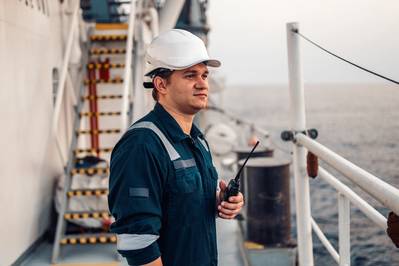Danica Boss Says Safer for Crews to Stay on Board
A crew specialist has urged ship operators to exercise caution when making crew changeovers while the coronavirus outbreak continues to rampage across the globe.
Responding to industry calls for seafarers to be given special travel dispensation, Henrik Jensen, managing director of Danica Crewing Services, warns that crew face a bigger risk of catching the virus while they travel to and from postings using public transport networks.
Better to extend contracts where possible, he advises, warning that merchant vessels are ill-equipped to care for seriously ill seafarers.
Jensen commented: “I understand why the ITF, ICS and others are arguing that seafarers should continue to travel to and from vessels for regular crew changeovers. However, with a potential 100,000 seafarers transiting each month, I do not believe this is the best approach at this present time.”
“Some vessel operators think it is stressful for crew to stay onboard for longer and better for them to go home – I disagree. That may well be the case for crew who have completed postings of more than nine months, such as many Filipino ratings do. However, for those with contract lengths of four to seven months, or less, I think it is not a problem to stay longer, rather than risk becoming infected as they transit home, or to jeopardize the health of those remaining by potentially bringing infected seafarers on to the vessel in replacement,” he explained, pointing out that the MLC does allow a maximum term of 12 months at sea.
Jensen warns that the risk to seafarers falling ill at sea is far greater than for those coming ashore: “If the homebound seafarer gets infected then hopefully the medical care systems in their home country will be able to cope. What really concerns me is what will happen to an infected seafarer onboard.
“Firstly, no commercial vessels are equipped to deal with a crew member seriously ill from coronavirus COVID-19 who may be in need of ventilation and intensive care. Help could be very far away if the vessel is on a long voyage – and even may not be readily available in port. Secondly, if the virus comes onboard then it will almost certainly affect several persons, if not the entire crew. Will the ship then be able to operate in a safe way? How can vessel operators provide medical care to an entire crew far out at sea?
“In my opinion, the safest way – although inconvenient and potentially stressful for the individual seafarer – is to halt the crew changes until the situation is under better control.”
He added that measures should be put in place to mitigate the problems faced by seafarers undertaking long postings. “Owners need to bear in mind that some seafarers may start to suffer from fatigue and that it might be necessary to adjust the crew’s workload where possible,” he said.
Jensen acknowledged seafarers could face unpleasant situations while the virus spreads among the population at home. “Owners should prepare for the unfortunate – but inevitable – situation where some of the onboard seafarers’ relatives will become ill or even pass away and, sadly, it will not be possible to repatriate the seafarer as it normally would be done,” he said.
“In Danica we have set-up contingency plans to deal with such situations, which include ensuring that external experts in mental health and well-being are ready to speak with the seafarers and relatives in their native language if needed and to give advice on how to cope with the stress.”
“These are difficult times and we must all pull together and make sacrifices to help each other. The world owes seafarers a great debt in keeping international trade – especially food and medicines – flowing,” said Jensen.
 Henrik Jensen, managing director of Danica Crewing Services (Photo: Danica)
Henrik Jensen, managing director of Danica Crewing Services (Photo: Danica)














